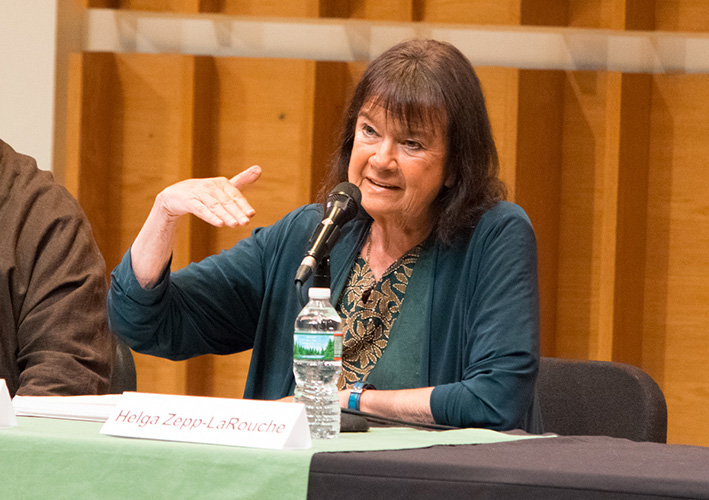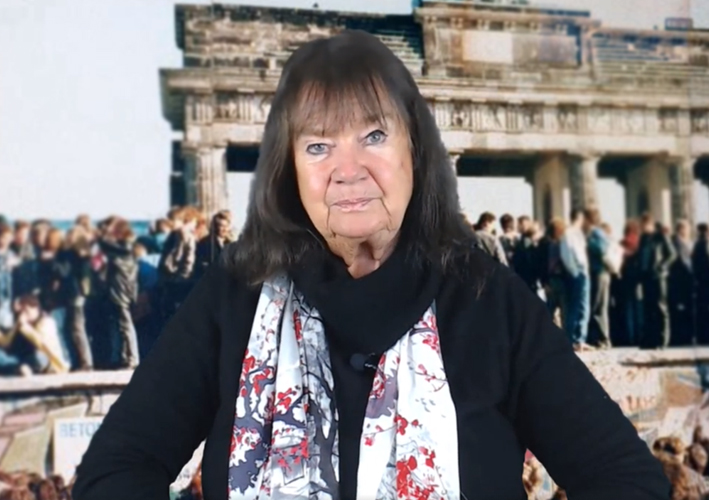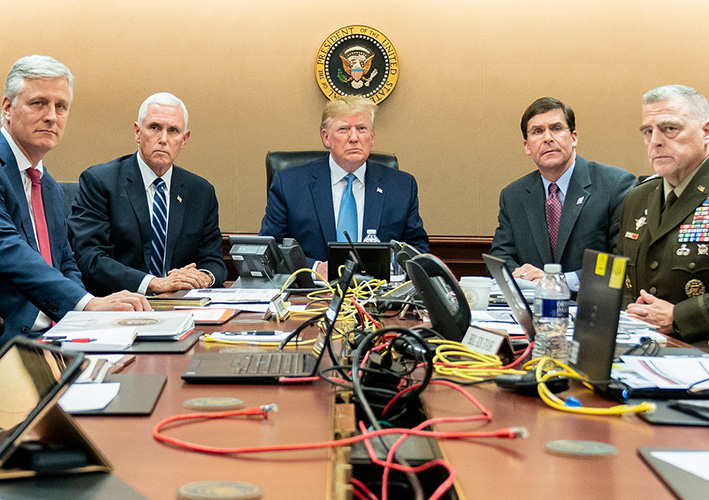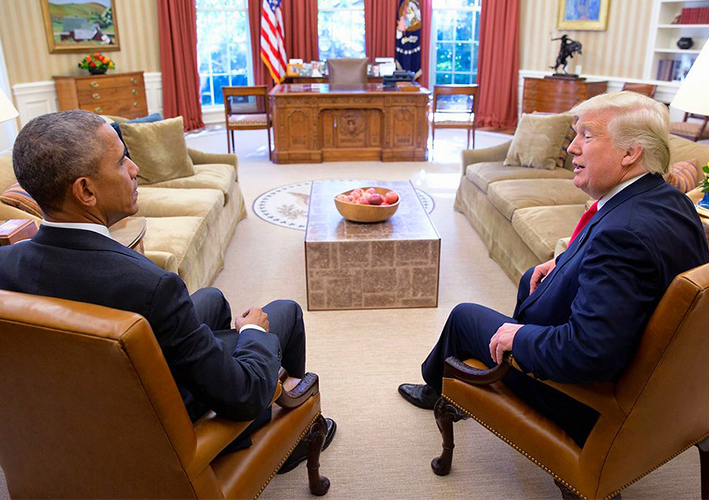by Helga Zepp-LaRouche, Chairwoman of the Schiller Institute
The first thing one can say about the performance of Beethoven’s Fidelio at the Darmstadt Theater, in a production of Paul-Georg Dittrich with a musical adaptation of the finale by Annette Schlünz, is: It’s god-awful! It couldn’t be worse. God-awful from a musical, artistic, philosophical and human standpoint. Of the long series of stupid, crude, repetitive Regietheater performances, that have been staged for over half a century(!)—limited at first to theater, but then also inflicted on the opera—this performance was the absolute low point.
In the summer of 1966, when Hans Neuenfels—then a 25-year-old dramatist at the Trier Theater—had a leaflet distributed to promote the “First Happening in Rheinland-Palatinate,” in which he even asked, “Why don’t you rape little girls?” he was expressing the convictions of the 1968 movement, as we have known it since at least Daniel Cohn-Bendit. Since then—for 53 years now!—various nudes, rock bands, schizophrenics, or actors in Nazi costumes have been copulating on stage, and have succeeded in distorting beyond recognition the plays and compositions of Classical poets and composers. This is definitely not originality.

A scene from the Darmstadt performance of Beethoven’s Fidelio.
The Fidelio staging in Darmstadt presents a multimedia mixture of aesthetic vulgarity, Brechtian alienation effects, and the intrusion during the first part’s musical scenes of a screen filling the entire stage, on which photos and film clips are projected. They are supposed to illustrate the historical background of eight productions from 1805 until today. The overall impression is chaotic, and you begin to feel sorry for the singers who have to sing against this storm of clips, and for the heroine Leonore, who has to run around the stage the whole time like a headless chicken.
But the real monstrosity comes in the second part, when the Finale, the opera’s magnificent hymn to freedom, is literally chopped up in martial manner by the insertion of compositions in the New Music style of Annette Schlünz. In the program notes, Schlünz describes her insertions:

Annette Schlünz
From the standpoint of the maltreated spectator, the noise that Schlünz inserted, during which the singers and instrumentalists trumpeted their deafening rubbish from the middle of the audience and from all sides, has nothing to do with music: It clearly crosses the line to bodily harm.
Just how emotionally damaged Schlünz is, becomes clear in the next sentences:
If there is anything crazy here, it is the pitiful state shown by Schlünz, in her emotional impotence to understand the sublime nature of the victory of the love between Leonore and Florestan. Moreover, she obviously cannot stand such greatness; her idea of wanting to speed up the music by adjusting a mixer console, represents the same uncontrollable freak-out that led the murderers of Ibykus to betray themselves after the choir of the Erinyes had called forth the higher power of poetry in the theater of Corinth. Small, base minds cannot stand great ideas nor sublime feelings.
The magnificent Finale of Fidelio, in which Beethoven celebrates the defeat of tyranny through the courage of conjugal love is an expression of the noblest humanity, where love, courage and the desire for freedom are expressed in music. In Leonore’s preceding aria, she sings: “I shall not waver, I am strengthened by my duty of marital love.” Beethoven chose as subject for the opera the idealization, in Schiller’s sense, of a historical event, namely the liberation of the hero of the American Revolution, the Marquis de Lafayette, the French Republican, by his wife Adrienne. This reflects Beethoven’s own republican sentiments, which included at that time of feudal structures and Napoleonic campaigns, both personal courage and the desire for freedom.

Portrayal of Leonora in the Darmstadt performance of Fidelio.
Such deeply human feelings, however, are no longer accessible to the disturbed emotionality of the representatives of the Frankfurt School and the liberal Zeitgeist. Stage director Paul-Georg Dittrich states most tellingly in his interview in the program notes, that the Finale seems to him “like a celebration where you don’t even know what is actually being celebrated.” While Dittrich and Schlünz may not know it, that in no way gives them the right to destroy ordinary people’s access to it by deconstructing Beethoven’s composition.
But precisely that was the intention from the very beginning of the diverse currents that formed the tradition in which Dittrich, Schlünz and the entire production in Darmstadt stand, in an amalgam of Theodor Adorno, the Eisler-Brecht School, and the Congress for Cultural Freedom (CCF).
In a noteworthy touch of truthful reporting, the Frankfurter Allgemeine Zeitung (FAZ) reported on November 12, 2017, in an article titled, “The CIA and Culture: How to Steal the Big Words,” about the exhibition organized on the 50th anniversary of a scandal that erupted in 1967, when it was reported that the entire gigantic operation of the Congress for Cultural Freedom was a CIA-funded operation as part of the Cold War effort. The FAZ added an admission about the whole thing that was tantamount to sensational for that daily:
The Fidelio production in Darmstadt is, so to speak, the terminal moraine of this process. It began with the change in U.S. post-war politics. After Roosevelt’s untimely death, under whose leadership the United States was allied with the Soviet Union in the fight against fascism in the Second World War, the intellectually much smaller Harry Truman quickly came under Churchill’s influence. The latter, in his notorious Fulton, Missouri speech on March 5, 1946, ushered in the Cold War. Thus the forerunners of those elements in the U.S. security apparatus, which Eisenhower later warned were the military-industrial complex and which are often called the “deep state” for short today, gained the upper hand. The Cold War thus proclaimed—demanded—that the deep emotions linking Americans and Russians together through the war experience, culminating in the meeting of the armies on the Elbe River in Torgau, be replaced by an anti-Russian sentiment. A new image of the enemy had to be built up and the population’s entire axiomatics of thought had to be changed accordingly. For the United States, this meant changing the basic beliefs that had contributed to the support for Roosevelt’s policies. For Europe, and especially Germany, the roots of European humanist culture, which constituted its cultural identity despite twelve years of a reign of terror, had to be destroyed and replaced by a construct—the deconstruction of Classical culture.
The Evil of the Congress for Cultural Freedom
The instrument that was created for this purpose was the Congress for Cultural Freedom (CCF), a gigantic psychological warfare operation launched by secret service circles around Allen Dulles under the direction of Frank Wisner, then head of the Office for Political Coordination of the State Department. The CCF was later moved to the covert operations department. The operation officially lasted from 1950 to 1967, when the New York Times published on April 27 the news that the CCF was a CIA operation. That revelation became the biggest cultural scandal of the 20th century. The CCF operated in 35 countries and published 20 magazines, and the CIA controlled virtually every art exhibition and cultural event. At that time, there was virtually no writer, musician, painter, critic, or journalist in Europe who was not in some way connected to this project—some knowingly, some with no inkling.

The first Congress for Cultural Freedom convention, Berlin, 1950.
The orientation of these cultural projects was essentially the same as that of the Frankfurt School, which was exiled to the United States during the National Socialist period and whose individual representatives were in the pay of the American secret services, such as Herbert Marcuse. In any case, the views of the Frankfurt School fit perfectly into the CCF’s program. Theodor Adorno, for example, defended the absurd and ignorant view that Friedrich Schiller’s idealism led directly to National Socialism, because he took a radical point of view. Therefore, Adorno claimed, beauty must be eradicated from art. In his essay “Cultural Criticism and Society,” written in 1949, his misanthropic view culminated in the much-quoted phrase: “To write a poem after Auschwitz is barbaric.”
Here again, there was nothing new about the Fidelio performance in Darmstadt. In the program notes, George Steiner expresses the exactly the same opinion:
What is expressed here in very clear terms is the psychological warfare carried out by the CIA-steered CCF, which was intended to eradicate the roots of the humanist identity of the German population, in favor of an Anglo-American cultural value scale.
To restate the point concisely: There can be no greater contrast than that between the sublime image of man presented in humanism and Classical art, and the barbaric image of man of the National Socialists. The Classical image of man sees man as being good in principle, as the only creature endowed with reason, who is able, through aesthetic education, to develop the potential within himself to a harmonious whole, to a beautiful character, as Wilhelm von Humboldt expressed it. Classical works of art in poetry, the visual arts, and music celebrate this beautiful humanity, and inspire in turn the creative powers of the readers, viewers, and listeners.
In contrast, the National Socialists’ image of man, with its blood-and-soil ideology, is based on a racist, chauvinistic, and Social Darwinist conception of the superiority of the “Aryan” race. To claim that because both the classics and National Socialism occurred in Germany, there is an inner connection between these diametrically opposed ideas, is just as absurd as to assert that the United States Constitution directly gave rise to the interventionist wars of the Bush and Obama Administrations, or that Joan of Arc’s convictions were the basis for French colonial policy. That claim actually came from the CIA’s devil’s kitchen, which included such recipes as “necessary lies” and “staunch denial” since at least the time of the CCF. In the recent period, the world has again been treated to an ample taste of them in the ongoing coup against President Trump by British intelligence in cooperation with the “deep state.”
The question of how it was possible to go from the ideal of the German classics to the abyss of Nazi rule, is one of the most important questions there is. To answer it, one has to consider the entire history of ideas from the Romantics’ attack on the classics, and the dissolution of the classic form it began to spawn, to the beginning of cultural pessimism, which set in with the Conservative Revolution in response to the ideas of 1789 and the political restoration under the Congress of Vienna, down to Schopenhauer and Nietzsche, the youth movement prior to World War I, and finally to World War I and its consequences.
Inducing Cultural Pessimism
Inducing cultural pessimism was also the goal of various music projects of the CCF. In 1952, it held a month-long music festival in Paris titled: “Masterpieces of the 20th Century,” during which over 100 symphonies, concerts, operas, and ballets of more than seventy 20th-century composers were performed. The Boston Symphony, which was to play a leading role in other CCF projects, opened the festival with a more-than-strange performance of Stravinsky’s Sacre du Printemps (Rite of Spring). Other pieces were performed from the atonalists Arnold Schoenberg (one of Adorno’s teachers) and Alban Berg, as well as Paul Hindemith, Claude Debussy, and Benjamin Britten, to name but a few. Further conferences for the propagation of atonal and twelve-tone music followed in Prato and Rome, which were exclusively devoted to avant-garde music. At all of these well-funded events, it was taken for granted that everyone would pretend to enjoy ugly music.

Theodor Adorno
The Darmstadt Summer Courses for New Music, which were also supported by the American military government and the CCF, performed Schoenberg, Anton Webern, and Béla Bartók. Lecturers such as Adorno, Olivier Messiaen, and John Cage gave lectures on their music theory. In an official assessment of these courses, Ralph Burns, head of the Office of Military Government, United States (OMGUS) Cultural Affairs Branch’s “Review of Activities,” wrote:
The issue here is not about stopping anyone from composing or listening to atonal or twelve-tone music, or other forms of avant-garde music. To each his own taste. The point is, that the idea of the equality of all tones of the tempered chromatic scale massively reduces the much higher degrees of freedom flowing from the polyphonic harmonic and countrapuntal composition, as it was developed from Bach to Hadyn, Mozart, Beethoven, Schubert, Schumann, and Brahms. It eliminates the ambiguity of the notes and the relationships between the keys, and the possibility of enharmonic confusion: Motivführung is a form of composition that, out of a single musical idea, develops further themes, movements, and ultimately the entire composition. This technique of composition, as elaborated and rigorously demonstrated in various master classes by Norbert Brainin, the first violinist of the Amadeus Quartet, was developed into greater complexity and perfection from Haydn’s “Russian” quartets Op. 33, to Mozart’s “Haydn” quartets, and then to Beethoven’s late quartets.
Given the heights that Classical composition had achieved with Beethoven, so-called modern music, if it throws these principles out the window—and there are undoubtedly good modern compositions—represents a decline comparable to reducing an anti-entropically developing universe of two trillion galaxies known so far, to a flat earth.
Classical Music Ennobles
Virtually all truly creative people, from Confucius to Albert Einstein, recognized and used the effects of good or Classical music to foster their own creative abilities and the aesthetic ennoblement of the population. Confucius rightly observed that the state of a country can be seen in the quality of its music. Immersion in the works of great Classical composers opens the deepest access to the creative faculties of the human soul and spirit. Where else, other than in Classical music, can one strengthen and deepen the passion needed to look beyond one’s own concerns and to address the great objects of humanity? Or where can one educate the sensibility needed to fulfill Schiller’s demand, as stated in his speech on universal history:
It is precisely this emotionality of love, as expressed in the Finale of Fidelio, love for one’s spouse, love for humanity, and the idea of freedom in necessity, the idea of fulfilling one’s duty with passion, and thereby becoming free, that Schiller defines as the qualities of his ideal of the beautiful soul and of genius. It is the quintessence of the entire aesthetic method of the classics and of Friedrich Schiller in particular: “It is through beauty that one achieves freedom.”
This notion of freedom is what all the proponents of Regietheater, disharmonious music, and postmodern deconstruction attack, because it goes against their liberal concept of “freedoms,” rather than freedom.
Therefore, they dip unrestrainedly into the mothballed box of Brechtian alienation effects: interruptions, film clips, banners, cameras pointed to the audience, etc., so as to “shock” the viewers out of their habits of hearing and thinking. What came out of that in Darmstadt was a mixture of “Clockwork Orange” (recall the violence-ridden atrocity from Stanley Kubrick, accompanied by Beethoven’s Ninth Symphony), and the intellectual depth of pop star Helene Fischer. When Helene Fischer, in a red latex outfit and with orgiastic movements, belts out her song “Tell Me, Do You Feel That?” to an enthralled audience, it’s about as subtle as when the question, “Does it move you?” lights up the stage in large neon letters during the entire Finale of Fidelio. Obviously, the director Dittrich thinks the intellectually challenged audience needs to be awakened with a two-by-four. On top of that came the previously mentioned bombardment of deafening noise from the instrumentalists and chorus members scattered throughout the opera house.
The audience expressed its thanks for the din with a tormented mini-applause. If the goal of the staging was to summon the audience to political action in the present or to open contemporary music to a “broader audience” (Dittrich), one has to say in both cases: Mission failed. The well-known (to German speakers) “Hurz” skit by Hape Kerkeling describes quite aptly the reaction of most viewers, who have apparently grown accustomed for much too long to the outrageous demands of Regietheater and to the CCF’s cultural war, which is still ongoing.
Finally, a quote is in order from Alma Deutscher, who really can compose: “If the world is so ugly, why should we make it even uglier with ugly music?”
Before the example of Annette Schlünz is followed and other compositions of classical music are “raped,” in the spirit of Hans Neuenfels, this review should serve to launch a debate in the year of Beethoven on how to defend the classics against such assaults.
Celebrate This Year of Beethoven!
This Year of Beethoven, which will feature performances of many of the master’s compositions not only in Germany, but around the world, offers a wonderful opportunity for us to recall our better cultural tradition in Germany, to resist the moral decline of the past decades, and to find within ourselves, by consciously listening to Beethoven’s music, the inner strength to have our own creativity come alive.
The world is now in the midst of an epochal change, in which the era dominated by the Atlantic countries is clearly coming to an end, and the focus of development is shifting to Asia, where there are many nations and peoples who are very proud of their civilizations, and nourish their classical culture. Some of these civilizations are more than 5,000 years old. If Europe has anything to contribute to shaping in a humanistic spirit the new paradigm emerging in the world, then it is our lofty culture of the Renaissance and the Classics.
Many scientists, artists, and people appreciative of Germany all over the world have been wondering for some time now what is wrong with the Germans, that they have distanced themselves so much from being a people of poets and thinkers. If we let the Year of Beethoven be so ruined, then Germany will likely be written off for good as a cultured nation.
More discussion of this subject is needed and welcome.
hz.zepp@schiller-institut.de
























